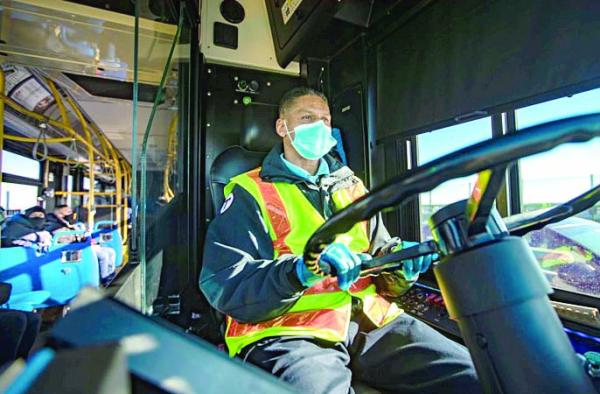December 23, 2021

MBTA bus driver Joao Goncalves transports passengers from Chelsea over the Tobin Bridge en route to Haymarket. Jesse Costa/WBUR photo
New MBTA employees could receive hiring bonuses under a collective bargaining agreement that officials ratified last Thursday, one of several steps the transit agency’s leaders are taking to attract workers amid a staffing shortage set to impact bus service.
The contract with Boston Carmen’s Union Local 589, the largest union representing MBTA workers, allows officials for the first time to offer bonuses of a still-unspecified amount to help entice new operators.
MBTA General Manager Steve Poftak said the bonuses, which the T’s board of directors approved as part of the bargaining pact, will serve as “an important tool in our toolkit going forward as we seek to address shortages in our workforce.”
Officials will also pay a higher training wage to MBTA recruits receiving their commercial driver’s licenses, promote dozens of drivers from part-time to full-time, and pivot away from an application lottery system to screen everyone interested in a position at the T.
In previous years, the MBTA has used a lottery to pare down a pool of jobseekers far greater than the number of available positions. A spokesperson said one human resources employee recalled that a 2009 lottery list drew more than 33,000 candidates for jobs and remained in use until at least 2016.
But as is the case at transit agencies and transportation companies around the country, the pandemic has created major staffing challenges at the T. Officials estimate the agency is about 80 to 100 bus drivers short of being able to run its fall schedule without dropping trips.
“As a board and as an organization, we all need to be aware of the demand problem that’s larger than just the MBTA. It will require all of us to be open to identifying what works and make us as attractive as an employer can be,” Transportation Secretary Jamey Tesler said. “The demand for that lottery system no longer exists.”
A winter service schedule that takes effect Sunday will pare back frequency on bus routes by about 3 percent in response to the workforce shortage. Subway schedules will not be affected.
Officials are hopeful that scheduling fewer trips will help address reliability issues exacerbated by the lack of drivers. As an example, Poftak said, a route could run with consistent 12-minute headways between buses, rather than 10-minute headways that sometimes become 20 minutes when the agency drops a trip because of its staffing levels.
He stressed that the imminent changes are “not a budgetary exercise. We are fully budgeted for a full level of service. We would dearly like to be providing that service and spending that money. Unfortunately, right now, we are having staffing challenges as is — frankly, every major transportation entity in the country is dealing with this.”
The agency more than doubled the size of its recruiting team, Poftak said, and promoted 75 part-time bus operators to full-time to help retain them.
Applicants must test negative for marijuana, which, Poftak said, reflects the tricky position the T occupies as an agency overseen by the Federal Transit Authority in a state where the substance is legal for recreational use.
He was unsure when asked how many applicants typically get ruled out by drug tests, but cautioned that “even losing a handful of people is an issue for us.”
The agency’s vaccine mandate is also impacting staffing, albeit at a low rate so far, as 23 of the 5,945 active MBTA employees remain out of compliance with the requirement that they get vaccinated against the virus or seek a religious or medical exemption, according to updated figures Poftak presented Thursday. Four of those workers have been suspended for five days, the second step in a progressive discipline process that could lead to termination.
“We are working with them in an attempt to make sure that they get vaccinated,” Poftak said. “We do want everyone to remain part of the workforce here at the MBTA, but vaccination is an important public health step, so this process will continue to play out.”
A dozen other workers had received notice that they were out of compliance and have since begun or completed their vaccination process, Poftak said.
A total of 456 employees, representing nearly 7.7 percent of the workforce, have requested exemptions. About 90 percent of the MBTA’s staff is partly or fully vaccinated.
The two-year contract with Boston Carmen’s Union is retroactive to July 1, 2021 and will provide covered workers annual raises of 2.5 percent. MBTA Director of Labor Relations Ahmad Barnes said a majority of union members will see an increase of $4,148 to their base salary by the contract’s end.
All bargaining unit members will also receive one-time bonuses of $2,000 in pandemic pay. Carmen’s Union workers on the payroll on March 1, 2022 will receive an additional $2,500 in one-time pay related to the outsourcing of shuttle bus diversions.
The union, which represents more than 6,000 MBTA employees, said members ratified the agreement “overwhelmingly” on Sunday ahead of the board meeting.
“Our first priority remains to provide riders with the vital public transit services they need each day to get to work, to get to schools, for medical appointments, and for other crucial daily activities. We think this deal helps support that priority in many ways,” said Carmen’s Union President Jim Evers, who added:
“The working condition improvements reflected in this agreement represent essential steps toward addressing the current recruitment and retention issues at the MBTA for the benefit of the rising public and for the public good.”
If the T opts to award hiring bonuses to brand-new employees, it must also offer the same to any bus operator hired within the past six months offset by any pandemic pay they received.



